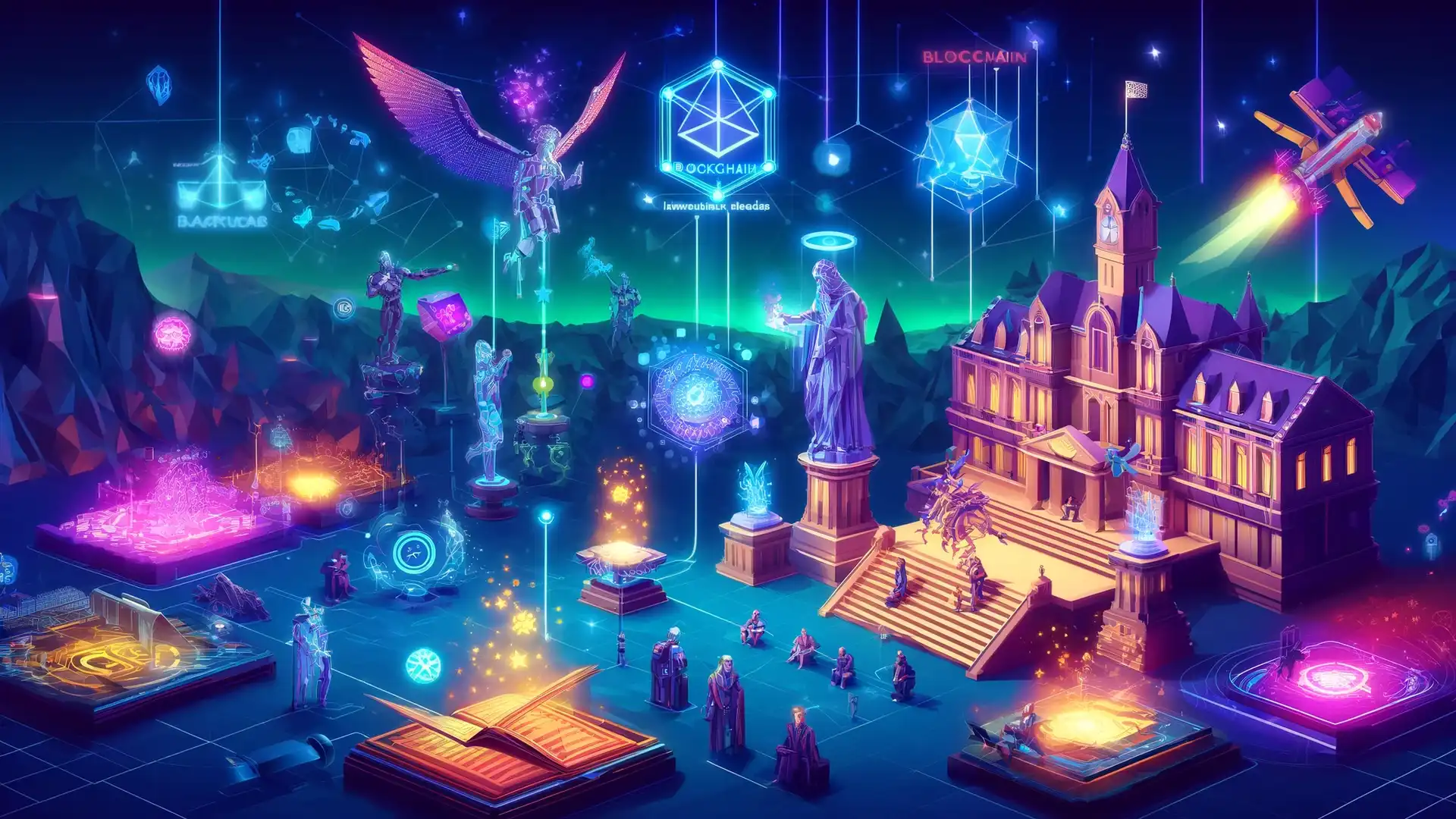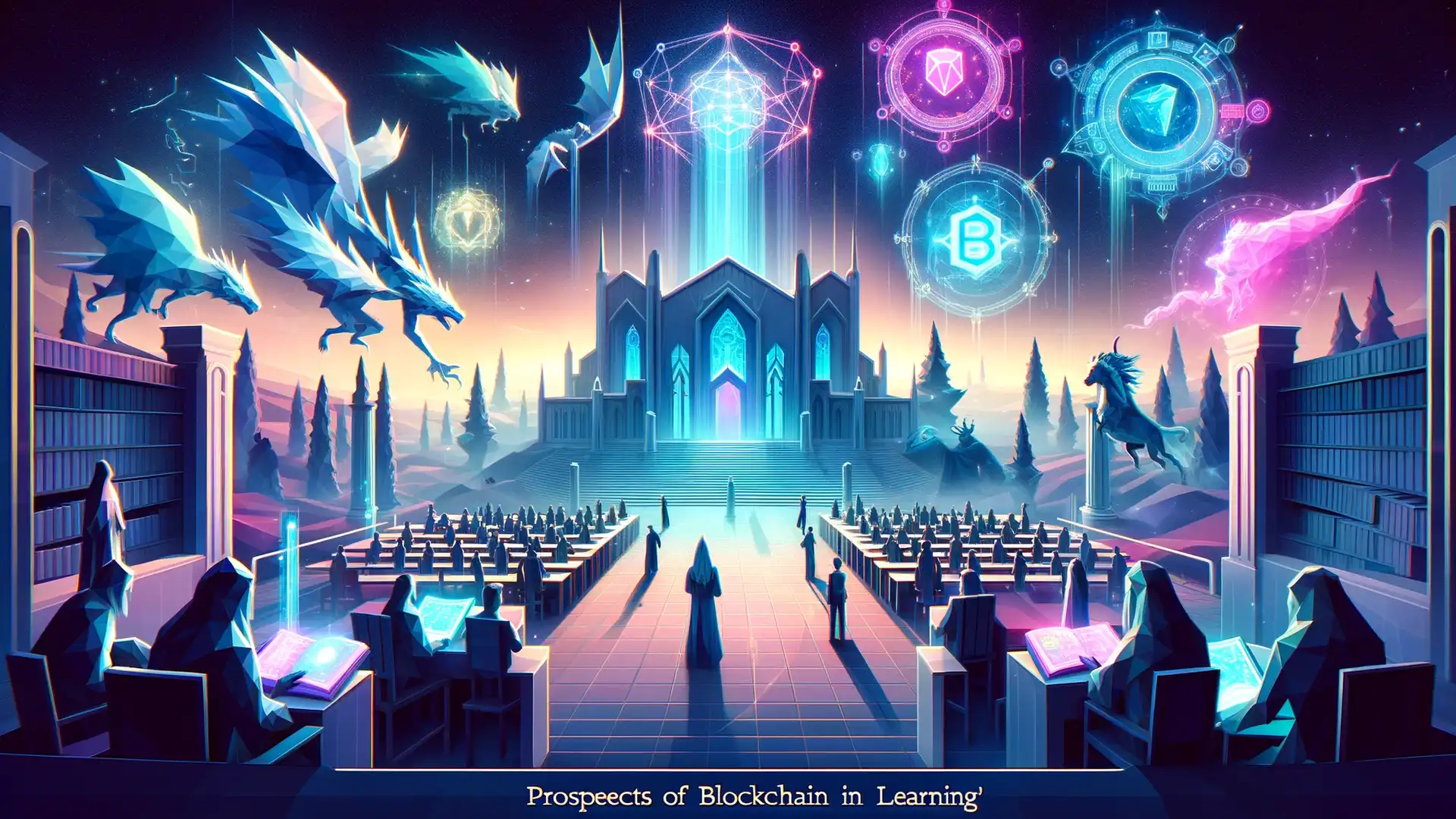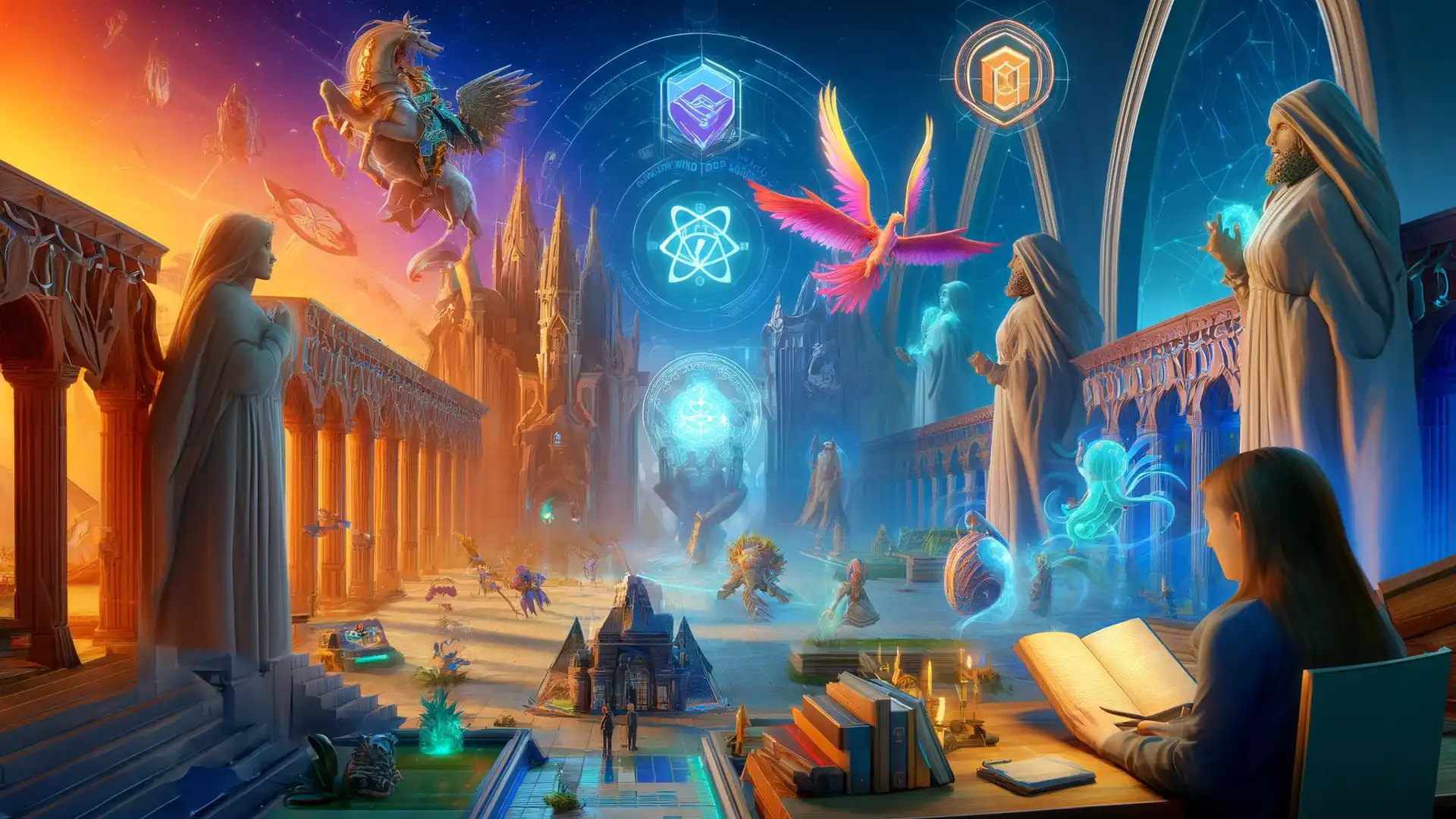The Future of NFT Credentials and Blockchain in Education: Exciting Prospects

 Author:
Artem Grigoriev
Author:
Artem Grigoriev
The Evolution of NFT Credentials and Blockchain in Education
Imagine a world where your hard-earned academic achievements are stored securely . They can be instantly verified by anyone, anywhere, without hassle. This is the promising future of NFT credentials (unique digital certificates).
📘 This article complements: "The Complete Guide to NFT Credentials". Explore it to find answers to all your questions;)
It's a revolutionary approach enabled by blockchain technology (a secure, decentralized system for recording information). NFT credentials, or Non-Fungible Tokens, represent a significant advancement. They change how we document and verify educational achievements.
These digital certificates are unique. Each one is different and cannot be replaced by another. They are immutable and tamper-proof. This means they cannot be changed once created. This offers a robust and reliable solution for both students and educational institutions.
The concept of NFT credentials hinges on their ability to provide a secure and immutable record of academic achievements. Traditional paper certificates can be lost, damaged, or forged. In contrast, NFT credentials are recorded on a blockchain —a decentralized digital ledger. This ledger records transactions spread across many computers.
This means the information is stored across many computers in a network. Once a credential is issued, it cannot be altered. This provides a reliable and trustworthy method for students to present their qualifications. According to a report by the World Economic Forum , blockchain's application in education could greatly enhance the security and authenticity of academic credentials.
This increased security is crucial in an era where credential fraud (fake academic qualifications) is a growing concern.
For students, the benefits are profound and far-reaching. With NFT credentials, the verification process is streamlined. Students can easily share their verified credentials with employers and educational institutions globally. This simplifies the often cumbersome process of credential verification.
This enhances the job application experience. It reduces the time and effort involved in proving one's qualifications. A study from Deloitte highlights that blockchain can reduce the verification time from weeks to just a few minutes . This significantly speeds up the hiring process.
This efficiency benefits not only students but also employers. It allows them to make quicker hiring decisions based on verified credentials.
In addition to their enhanced security and ease of verification, NFT credentials offer global recognition and portability. Traditional paper certificates can be a hurdle for students and professionals crossing borders for education and employment. NFT credentials, however, are accessible and verifiable worldwide.
This makes them an ideal solution for an interconnected global community. The UNESCO has recognized the potential of blockchain. It sees blockchain as a tool to create a more inclusive and equitable educational landscape. This recognition underscores the transformative potential of blockchain.
It helps in democratizing (making accessible to everyone) education access.
Blockchain technology also plays a critical role in reducing credential fraud. The immutable nature (cannot be changed) of blockchain records makes it nearly impossible to fabricate or alter credentials. This maintains the integrity of academic qualifications. It protects the value of the credentials.
💡 Note: NFT credentials are universally accessible (usable anywhere in the world). They are verifiable by anyone with internet access. This breaks down geographical barriers. It facilitates international academic and professional mobility. This global accessibility ensures that students and professionals can move across borders with ease. They do not need to worry about the validation of their qualifications.

It instills greater confidence in employers and institutions regarding the authenticity of applicants' qualifications. According to the International Association of Privacy Professionals (IAPP) , the security features of blockchain could drastically reduce incidents of fraud and misrepresentation (lying about qualifications) in academic records.
This reduction in fraud helps maintain the reputation of educational institutions. It boosts the trustworthiness of their credentials.
Furthermore, blockchain technology streamlines the job application process. With verifiable credentials readily available on the blockchain, the need for time-consuming background checks is minimized. This accelerates hiring processes and reduces administrative burdens on HR departments.
This benefits both job seekers and employers. It creates a more dynamic and responsive job market. The speed and efficiency of this process are particularly advantageous in competitive job markets. Timely hiring decisions are crucial in these markets.
Another significant advantage of blockchain is the enhanced privacy and control over personal data it offers to students. Students can manage and share their credentials without compromising their privacy. Blockchain allows for selective sharing of information.
This means students can control who has access to their data and for what purpose. This ensures their personal information remains secure. This aspect of data privacy is supported by the principles of the General Data Protection Regulation (GDPR) . These principles advocate for increased control over personal data.
This control over personal data aligns with growing concerns over data privacy and security in the digital age.
The integration of NFT credentials also supports lifelong learning and credential accumulation. Individuals can build a comprehensive record of their skills and achievements over time. This integrates their professional and academic portfolios seamlessly.
This lifelong ledger (record) of learning supports continuous personal and professional development. It makes it easier for individuals to demonstrate their evolving expertise to potential employers or academic institutions. This ongoing accumulation of credentials promotes a culture of continuous learning.
It fosters adaptability in an ever-changing job market.
In conclusion, NFT credentials and blockchain technology are set to transform the education sector . They provide enhanced security, greater transparency, and broader access to opportunities. By leveraging these innovative technologies, educational institutions can offer a more secure, efficient, and personalized education system.
This system meets the needs of the digital age. It offers unparalleled benefits to students worldwide. It paves the way for a more inclusive, equitable, and efficient educational landscape. This landscape empowers learners and institutions alike.
💡 Tip: Blockchain and NFT credentials democratize access. They provide verifiable, portable credentials that are not limited by traditional barriers. This empowers underrepresented groups and regions. It ensures that everyone, regardless of their background or location, has equal access to education and employment opportunities.

Navigating Challenges and Embracing the Future of NFT Credentials
Picture a classroom where course enrollments, tuition payments, and certificate issuance are handled automatically and seamlessly. This efficient scenario is possible with smart contracts . These digital agreements execute automatically when specific conditions are met. They ensure transparency, reduce administrative overhead, and minimize human error.
By automating these tasks, educational institutions can focus more on teaching and less on paperwork. According to a report by PwC , smart contracts can revolutionize administrative tasks in education. They improve efficiency and accuracy.
Additionally, smart contracts can automatically process tuition payments and scholarship disbursements. This simplifies financial transactions for students and institutions alike.
Real-world applications of NFT credentials are already showcasing the transformative potential of blockchain technology. Universities leverage blockchain for secure transcript verification. Professional organizations issue blockchain-based certifications.
These practical case studies highlight tangible benefits. They serve as blueprints for other institutions considering blockchain adoption. For example, a university in Malta uses blockchain to store and verify academic records. This provides students with secure and easily accessible credentials.
According to a Forbes article , this initiative has significantly reduced fraud and administrative costs. Additionally, MIT has implemented blockchain technology to issue digital diplomas. This ensures graduates can easily share their verified credentials with employers worldwide.
Implementing NFTs in education does come with challenges. Technological barriers, such as the need for robust digital infrastructure, and cost concerns are significant hurdles. Additionally, there is often resistance to change, especially in traditional institutions.
However, these obstacles can be overcome with strategic investments in infrastructure and training for educators and administrators. Developing clear policies and standards is crucial. Collaboration with technology experts and early adopters can facilitate a smoother transition.
The OECD suggests that a multi-stakeholder approach (involving many different groups working together) ensures successful implementation. Institutions must also address data privacy concerns. They must ensure compliance with regulations such as the GDPR to protect student information.
Looking ahead, several future trends in NFT credentials and blockchain technology are poised to reshape education. Increased adoption of blockchain for maintaining academic records and the rise of decentralized education platforms, which operate without a central authority, are notable trends.
The growing acceptance of micro-credentials and digital badges indicates a move towards more flexible and accessible education systems. According to the World Bank , these trends could democratize education. They could make high-quality learning opportunities available to a broader audience.
The use of blockchain could also facilitate the creation of global education networks. This enables students to access resources and credentials from institutions around the world.
💡 Note: Blockchain's immutable nature ensures that once data is recorded, it cannot be altered. This provides a high level of security and trust. It is crucial for maintaining the integrity of academic records and ensuring credentials remain verifiable over time.

Educational institutions can prepare for blockchain integration by updating curricula to include blockchain literacy. They should teach students about blockchain and its applications. Investing in blockchain research and fostering partnerships with tech companies can be beneficial.
Ethical considerations, such as ensuring data privacy and addressing the digital divide, are crucial. Institutions must work to prevent further inequality in access to education. They must ensure all students benefit from these advancements. The International Journal of Educational Technology in Higher Education emphasizes the importance of addressing these ethical issues. This creates a fair and inclusive educational environment.
Promoting blockchain literacy among students will equip them with the skills needed to navigate and leverage this technology in their future careers. Blockchain's transparency and immutability can uphold academic integrity by making it more difficult to forge credentials.
However, maintaining ethical standards in the use of these technologies is essential to avoid potential misuse. Decentralized learning platforms offer learners more control over their educational journey. They provide access to diverse resources and personalized learning paths.
These platforms can securely store academic records and issue digital diplomas. This enhances the recognition of skills and competencies acquired through various learning experiences. The transparency offered by blockchain also supports accreditation bodies in verifying institutional quality and program standards. This ensures that educational programs meet established criteria.
The potential for new opportunities in lifelong learning is another key focus. Blockchain and NFT credentials can support continuous education. They recognize and validate skills acquired outside traditional educational settings.
This includes issuing micro-credentials—small, specific certifications recognizing a particular skill or knowledge area. These micro-credentials can be particularly useful in a rapidly changing job market. The Blockchain Research Institute highlights that blockchain can significantly enhance lifelong learning. It provides a secure and verifiable record of skills and achievements.
These micro-credentials can be stacked to form comprehensive qualifications. This promotes a modular approach to education. Creating future-proof education systems that are adaptable and resilient to technological advancements is essential.
Maintaining global education standards is crucial in this endeavor. This ensures that blockchain and NFT credentials are recognized and respected worldwide. Establishing international standards and protocols to facilitate global interoperability is key. The European Commission is actively working on developing such standards. These standards ensure the seamless integration and recognition of blockchain credentials across borders.
International collaboration will be key to achieving these standards. This ensures that digital credentials are universally accepted.
In conclusion, the future landscape of NFT credentials is bright. It promises a more secure, efficient, and inclusive education system driven by the power of blockchain technology. By preparing for these changes and addressing the challenges head-on, educational institutions can harness the full potential of NFTs and blockchain.
They can transform how we teach, learn, and verify academic achievements. This transformation will enhance the educational experience for students. It will also provide educators with the tools needed to create more dynamic and responsive learning environments.
💡 Tip: Institutions should integrate blockchain technology gradually. Fostering a culture of innovation and staying informed about ongoing developments is essential. By piloting blockchain initiatives in specific areas before full-scale implementation, institutions can manage risks and make necessary adjustments.

NFT Credentials for Skill Verification: Pros and Cons
The Role of Smart Contracts in NFT Credentials: Their Importance Explained
NFT Credentials: Revolutionizing Online and Distance Learning
The Environmental Impact of NFT Credentials
Building Communities and Networking: Opportunities Opened by NFT Credentials
